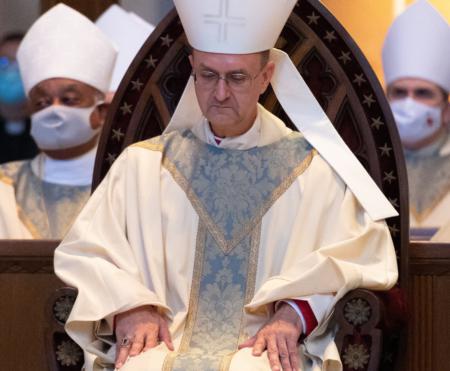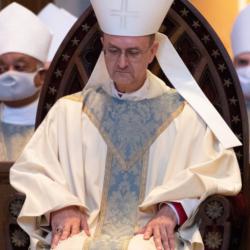Immigrants share their stories at Social Justice Convocation panel
BOSTON -- Geovany is working on his associate's degree in computer science. He hopes, at some point, to work for Google, Apple or one of the other large American tech companies. He's nervous, though, he told attendees of the 9th annual Social Justice Convocation, Nov. 4, because he has no legal status in the United States, and the future of DACA, the program that allows him to legally remain in the country, is uncertain.
Speaking during a Catholic Charities-run panel on immigration, Geovany, who only gave his first name due to his possible future immigration status, gave a brief overview of his childhood. He was brought to the U.S. from his home country of Guatemala at the age of 11 by his mother. He had no say in the matter, he explained. The two of them settled in Lynn, and Geovany began attending public school.
He excelled at school, learning English quickly and doing well in his classes. In high school, however, he began to slow down. With no legal status, and no job opportunities, he said he "lost motivation." He dropped out of school, not knowing what he wanted to do with his life.
Geovany saw a path forward in Catholic Charities Education Center in Lynn, which provides out-of-school youth with GED preparation classes and skill training. He also found hope in President Obama's 2012 Deferred Action for Childhood Arrivals (DACA) program.
DACA, which grants permission for eligible unauthorized immigrants who were brought to the U.S. as children to work and obtain an education in this country, allowed Geovany, now with his GED, to apply to college.
He was accepted into a local community college, where he currently studies computer science.
"I wanted to be somebody, not just for my family, but for myself," he said.
Yet, now, once again, he is nervous about his future. The Trump Administration began winding down the DACA program on Sept. 5, announcing that Congress would have to act to preserve DACA before the 800,000 recipients begin losing their statuses in March of next year.
"Basically, this is my country," said Geovany. "I feel as American as anybody else."
Geovany was joined on the panel by Debbie Rambo, president of Catholic Charities of the Archdioces of Boston; Marjean Perhot, director of Catholic Charities Refugee and Immigration Services; Jill Marie Bussey, director of advocacy at the Catholic Legal Immigration Network, Inc. (CLINIC); Barbara Allaire, a member of the POWR team at Sacred Heart and Our Lady Help of Christians Collaborative in Newton that recently sponsored a refugee family; and a high school junior from Brockton who is an immigrant from Haiti.
The Brockton student told the audience he arrived in the U.S. as a child, and although he is not a U.S. citizen, has been able to remain in the country thanks to Temporary Protected Status (TPS). The status, issued after the 2010 earthquake that devastated much of Haiti, gives protection from deportation, and authorizes employment.
Yet, unless the Trump Administration moves to extend the status, it will expire on Jan. 22, leaving him uncertain about his future.
Right now, he is considering offers from a number of colleges, but is if TPS is rescinded, he may have to leave the U.S. If that happened, he said, "I don't know what I would do."
Speaking last, Perhot said she hopes those in attendance are "motivated to take action and to raise your voices" after the panelists.
"What's happening to our immigrant brothers and sisters is unjust, and in many cases, inhumane," she said, and the time to act is now.
"Your voices are powerful, and immigrant brothers and sisters need your voices now."



















